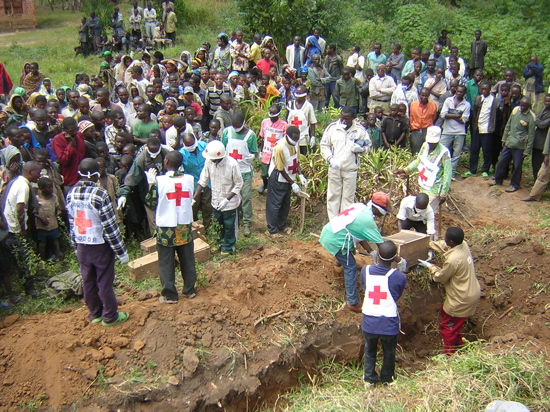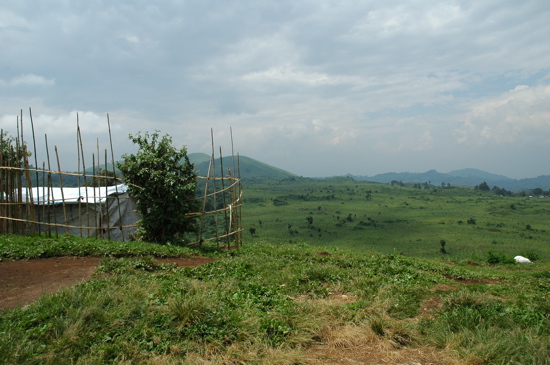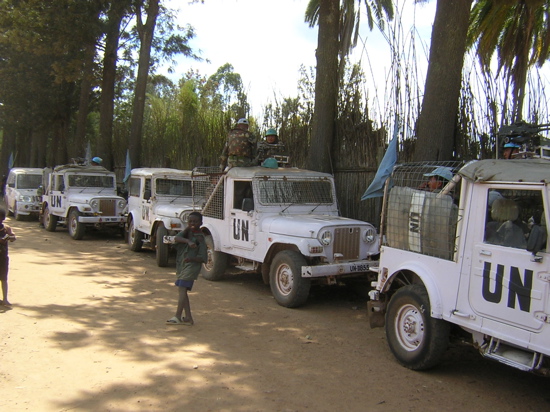On May 18 Turkish diplomat Baki I`lkin sent the Interim Report of the Group of Experts on the Democratic Republic of the Congo to the United Nations Security Council. I`lkin's cover letter sounded hopeful, but resigned. "I would appreciate it if the present letter, together with its enclosure, were brought to the attention of the members of the Council and issued as a document of the Council," he wrote. International media has yet to review or investigate this report despite the fact that what is left of the world's "free" press has been consistently manipulated by special interests, including the US State Department. Without some digging on the part of journalists, I`lkin's important report, along with the truth and incinerated Congolese children, might well become buried.

Image: Luofu Burial Copyright ©HRW
Diplomat Baki I`lkin's group arrived in Kinshasa DRC on March 20, 2009 and spent five weeks in the field before it issued a report detailing the spectacular failure of the joint Rwandan/Congolese military operation, Umoja Wetu. The Congolese (FARDC) and Rwandan (RDF) initiative was ostensibly advanced to eliminate the Rwandan Hutu militias (FDLR) and remnants of the genocidaires who were responsible for up to one million deaths in Rwanda in 1994. This theater of operation took place against a backdrop that included 1.2 million refugees in Congolese IDP camps. An additional 250,000 have been displaced since operation Umoja Wetu began, and there have been untold rapes, burnings, murders, pillaging and tortures against innocent civilians in the interim. Umoja Wetu began days after the ouster of CNDP (Congrès National pour la Défense du Peuple) rebel General Laurent Nkunda and his betrayal by his former ally Rwanda.
Forces loyal to Laurent Nkunda have consistently maintained that the Congolese government has used the FDLR as a kind of "allied-force" in its battles against Nkunda, who was gaining territory and presented a real threat not only to the Government of Joseph Kabila, but also to Rwanda's Tutsi President Paul Kagame. Kagame found himself facing competition from a charismatic Congolese Tutsi rebel leader whom he once supported, but who now was reaping territory and a popularity that could become problematic. Rwanda is a country the size of the state of Maryland with no resources. At stake: Congo's mines (gold, cassiterite), forestry, real estate, and control over a country that could be the breadbasket of the region if given the leadership and opportunity to do so. It should not go unnoticed that the United States and the European Union have strategic interests in the minerals of this region and the United States has a new $80 million dollar embassy in Kigali.
Joint military operations were conducted in January 2009 within the framework of a secret agreement between Kagame and Kabila. It can be demonstrated that the United States was the prime mover and shaker behind this agreement, which resulted in a humanitarian crisis that is almost beyond imagination. The drumbeat against the CNDP and Nkunda and other central African rebel leaders has existed since at least 2004 and is easily reviewed. The failure of media to scrutinize reports coming out of the State Department, and the media's tendency to accept statements from diplomats at face value can be construed as contributing to the continuing bloodshed in Congo's wars. The total death toll is six million and counting. Operation Umoja Wetu was a dismal failure, and the United States was solidly behind it. The public record supports this.
Umoja Wetu: A Catastrophic Failure and Arms from Sudan
Excerpt from the May "Special Rappateur" UN report:
During Umoja Wetu, the FARDC-RDF (Congolese/Rwandan) alliance was able to push back FDLR (Rwandan rebels) from some of its key locations, but the military operation suffered from a short time span, logistical bottlenecks and the reported embezzlement of operational funds, and failed to break the FDLR command and control apparatus, which remains intact. Since the withdrawal of RDF (Rwandan military), FDLR has counterattacked in various locations across North and South Kivu, resulting in increased civilian casualties. Delays in the disbursement of FARDC (Congolese army) salaries have also exacerbated indiscipline within the newly integrated FARDC units, resulting in ongoing human rights violations perpetrated by FARDC, including looting and attacks on the civilian population.

Image: CNDP territory before Umoja Wetu Copyright © G. Nienaber
Human Rights Watch and other groups have been screaming about the military failure and its impact upon the civilian population of eastern Congo for months. The 27 page Interim Report supports what HRW, OXFAM, CNDP remnants, humanitarians, informants, and others have been saying.
The report also details something new and worrisome--massive airlifts of arms and ammunitions to the Congolese military (FARDC) through Khartoum, Sudan.
The Group of Experts has obtained information to the effect that arms and ammunition were transported to FARDC from the Sudan in December 2008 and February 2009. The military equipment was loaded at Khartoum International Airport on to a Boeing 707 aircraft registered in the Democratic Republic of the Congo that had been requisitioned by the Ministry of Defense of the Democratic Republic of the Congo in September 2008. Flights of the aircraft occurred on 4 and 5 December 2008, and on 12 and 14 February 2009. The Group has submitted a request to the Permanent Mission of the Sudan for further clarification. The Group is concerned that continued violations of paragraph 5 of resolution 1807 (2008) could further hinder mechanisms to promote effective stockpile management by FARDC. The Group is looking into further violations and will report to the Committee in due course.
This is a stunning report, especially given the tremendous US presence in Sudan, a United Nations base at Khartoum, and the appointment of a State Department Special Advisor for Conflict Resolution, Tim Shortley. Shortley has worked hand in hand with Assistant Secretary of State for African Affairs Jendayi Frazer in Congo, Uganda, and as Director of Sudan Programs at the State Department. Frazer is the former U.S. Assistant Secretary of State for African Affairs in the George W. Bush administration and joined the faculty at Carnegie Mellon University in January 2009.
The Special Rappateur deserves an international response, through the United Nations Security Council, regarding this arms shipment. He has asked for serial numbers, identification numbers, and marking codes. It is hard to imagine that the recent airlifts of munitions from Sudan to Congo could have gone unnoticed by the State Department and its agents, given our intense military and espionage presence in the region. The panel of UN experts deserves media support for their request regarding manufacturing and serial numbers on the munitions and arms that were smuggled into DRC in December 2008 and February 2009. These munitions, which packed a Boeing 707 on at least four separate flights, will be used by the Kabila government against civilians. The track record has been demonstrated.

Image: Where is MONUC in all of this? Copyright © HRW
US State Department Dictates Policy through Frazer and Shortley
Shortley's imprint is all over Central Africa, including a stint at USAID, the Defense Department, and in 2007 a "special appointment" by the State Department as "Senior Advisor on Conflict in Africa". As more and more information comes in, it seems that there has been a pattern of disinformation at best and outright lying at worst on the part of the State Department in order to manipulate impressions on what is truth in eastern Congo. The initial focus of Mr. Shortley's work was conflict resolution in northern Uganda. A recent Newsweek story mentions Shortley and his close ties to Secretary Frazer. Newsweek reports it was Frazer who suggested assassination as a possible solution to problems with rebel leaders in Uganda.
Kony's (rebel leader in Uganda) interest rose visibly when the Bush administration sent a young American, Tim Shortley, to push for a comprehensive agreement. Frazer-who says she never thought Kony was serious about peace, especially not after the ICC (International Criminal Court), issued its arrest warrant for him in 2005-nevertheless urged Shortley to "go out there and do more, do everything you can to get this guy to sign." The United States contributed more than $10 million to underwrite the process. The United Nations had passed a resolution conveying "deep concern" about the LRA, and was pushing hard for an end to the conflict. Museveni (President of Uganda) even sent Kony's own mother to meet with her son in the bush and beg him to surrender. But behind the scenes, Frazer was getting frustrated. At one point she quietly asked Museveni, "Why don't you just ambush Kony when he's in one of these meetings?" "We don't ambush people," Museveni told her. "If we're in the bush and somebody's back is turned, before we strike, we'll cough."
Frazer had also been committed to neutralizing CNDP rebel leader Laurent Nkunda since at least 2007, according to reports we have been receiving from CNDP factions still loyal to Nkunda. Frazer's public statements corroborate these accusations by CNDP officers who were advisors to Nkunda before his detention by Rwandan authorities in January 2009.
From CNDP contact:
Just to let you know that Mrs. Jendayi Frazer with his (sic) Special envoy for US Department Mr. Tim Shortley who is now in Sudan, were working for KABILA, because always when Tim was coming with Kabila's proposals after convincing him that he will oblige us to adhere to his proposals and when we refused, he always says that the USA is going to take strong measures against us, just trying to exercise a kind of terrorism. Jendayi was supporting Kabila too much and was against us. And you know how Government proposals are regarding to the revolutionaries.
So, the question arises: How involved was the United States State Department in the destabilization of the Kivu provinces in eastern DRC? Did our State Department officials become "terrorists" in the eyes of a revolutionary movement in Congo? The United States has supported rebel armies before, especially if it served our interests. What exactly happened behind the scenes that journalists have not explored?
Human Rights Watch was severely critical of the aftermath of the 2006 voting process. The 96-page report, "We Will Crush You," documents the Kabila government's use of violence and intimidation to eliminate political opponents. Human Rights Watch found that Kabila "set the tone and direction by giving orders to 'crush' or 'neutralize' the 'enemies of democracy,' implying it was acceptable to use unlawful force against them.
This report focuses on some of the most violent episodes of political repression in Kinshasa and the western province of Bas Congo during the two years following the 2006 elections. The brutal and repressive tactics used by President Kabila and his advisors are emblematic of the resort to violence to stifle opponents. During our research, Human Rights Watch received reports of other incidents of repression, often smaller in scale and sometimes less violent, that are not included here. The violence in eastern Congo, where the Kabila government is in a military confrontation with an insurgency led by former general Laurent Nkunda, has been documented in other Human Rights Watch reports.
The government's lack of popularity in western Congo, and the fear of losing power through a military overthrow, have dominated policy discussions amongst Kabila and his advisors in their first two years of administration. According to many military and intelligence officials and others close to Kabila who were interviewed by Human Rights Watch, Kabila set the tone and direction of the repression. In giving orders, he spoke of "crushing" or "neutralizing" the "enemies of democracy," "terrorists," and "savages," implying it was acceptable to use unlawful force against them.
It would not be long before Secretary Frazer would appropriate Kabila's term "Crush" to describe United States policy with regard to "rebel" movements which did not serve its own interests in Africa.
Tripartite Commission Sets the Tone and Frazer Coins "Negative Forces"
In October 2007, Jendayi E. Frazer, then Assistant Secretary for African Affairs, addressed the U.S. Senate Committee on Foreign Relations Subcommittee on African Affairs. Frazer crowed to Chairman Russ Feingold that she had "a good story to tell." She spoke of "Negative Forces" (Nkunda and the FDLR) and "reliable partners" (Rwanda), and introduced her "newly-appointed Senior Advisor for Conflict Resolution, Timothy Shortley," who "will work to makes sure US views are "taken into account." At this point in time, Shortley was working on the Juba peace initiative in Uganda.
In addition, Shortley would be her new point man in Congo. According to reliable testimony from Congo and the CNDP, Shortley wasted no time in making certain that US views were taken into account and threatened Tutsi rebel leader Laurent Nkunda if Nkunda would not voluntarily go into exile.
Frazer to Feingold:
In order to respond to the current humanitarian and security crisis in eastern Congo, I directed Mr. Shortley to take the lead in expanding and intensifying implementation of our strategy to resolve the crisis in North Kivu. He has met with government officials, UN Organization Mission to DRC (MONUC) political and military leadership, and European partners in the Congo, New York and Washington. This training will underpin diplomatic efforts in the east to neutralize renegade military units and foreign armed groups. He will continue on to Rwanda to discuss efforts to neutralize the ex-FAR and Interahamwe
There was no denying who the "negative forces" were in Frazer's eyes. They would be "eliminated."
Tim Shortley is now in Sudan, the source of the arms shipments to Joseph Kabila in Congo. The US State Department was compelled to put out the following press release after the Sudanese press reported that Shortly was allegedly meeting recently with rebel factions in Sudan:
Tim Shortley is the Director of the Sudan Programs Group in the Bureau of African Affairs at the U.S. Department of State. News reports of why he is in Khartoum are false. His primary purpose for visiting Khartoum (following his attendance at the African Union Summit) is to meet with officials of the Government of National Unity and various Non-Governmental Organizations to discuss the situation in Darfur and the implementation of the Comprehensive Peace Agreement.
Plausible denial? Time will tell if more rebel leaders in Africa are "crushed" in the name of peace for the corrupt and misery for the innocent. Perhaps the Sudanese press with access to Shortley can request the serial numbers on those munitions for diplomat Baki I`lkin. It would be interesting to see where they were manufactured.
A State Department official today confirmed this statement regarding policy on arms shipments:
The United States Government remains concerned by any and all shipments of arms or related material to the DRC that is not notified in advance to the DRC Sanctions Committee etablished by the Security Council, as required. We take all such reports seriously and work with the DRC government and other interested countries to ensure that weapons entering the DRC are kept to a minimum.
Researcher Rena Ali contributed to this truncated report. The full report will be published in the LA Progressive.
Calls and emails to Secretary Jendayi Frazer and to the Carnegie Mellon Press Office have gone unanswered and unreturned.
